 |






|
| PROGRAMME
"LISBOA LIMPA TEM OUTRA PINTA!" (A CLEAN LISBON HAS A DIFFERENT APPEARANCE!) |
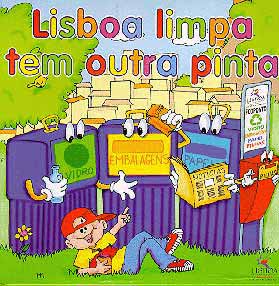 DHURS/DSES has been developing a programme within
the field of Environmental Education since 1993. Known as "A Clean Lisbon has a
different Appearance!", this programme is directed at children attending Official
Primary Education Schools in the Lisbon municipality. DHURS/DSES has been developing a programme within
the field of Environmental Education since 1993. Known as "A Clean Lisbon has a
different Appearance!", this programme is directed at children attending Official
Primary Education Schools in the Lisbon municipality. Together with the collaboration and commitment of
the teachers, it aims to promote the following in schools:
- Students who are interested and motivated to
conserve the Environment, thus helping to form an awareness in relation to the global
Environment;
- Acquiring information regarding the
Environment, specifically in the area of solid urban wastes;
- Attitudes in line with Environmental
conservation; creating values for protecting the Environment;
- Acquiring suitable capacities by developing
concrete activities.
For further information about this
Programme, visit the Zeca site on the Net or contact us. |
| Programme
"Escola a Escola Pró-Ambiente" (School to School Pro-Environment) 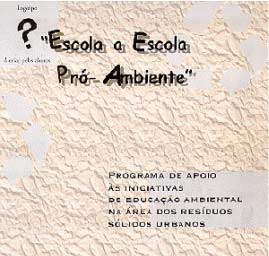 Responding to environmental
needs, safeguarding resources and reducing wastes to be eliminated, are all a part of
environmental education, which like other areas of civil education, must be meaningful to
the youth, within the perspective of actively intervening in the environment. Responding to environmental
needs, safeguarding resources and reducing wastes to be eliminated, are all a part of
environmental education, which like other areas of civil education, must be meaningful to
the youth, within the perspective of actively intervening in the environment.
Within the aim of
continuity, the School to School Pro-Environment follows the "A Clean Lisbon has a
different Appearance!", Programme. One hopes to create the foundations leading to a
generation sustained by the principles of a new relation between man and the environment.
The "School to School
Pro-Environment" hopes to encourage the development of projects of the 2nd and 3rd
cycle schools in the Solid Urban Wastes area, namely in that pertaining to hygiene in
public areas and the three R policy: "Reduce, Re-use and Recycle". In this way
one hopes to reach the interests and motivations of teachers and students, as well as
allow for co-ordination with the school syllabus. |
| Zeca
on the NetThe use of new communication technologies, namely those afforded by the
Internet, is recognised as being essential in the training of tomorrow's citizens.
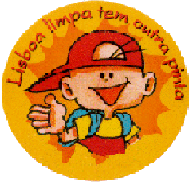 With the objective of motivating the use of study, research and
exchange of information potential that the Internet makes possible among the school
communities, the Ministry of Science and Technology is equipping all the schools in the
country with computers with access to the Network. With the objective of motivating the use of study, research and
exchange of information potential that the Internet makes possible among the school
communities, the Ministry of Science and Technology is equipping all the schools in the
country with computers with access to the Network.
Hoping to contribute
towards this objective, the "A Clean Lisbon has a different Appearance!"
Programme is on the Internet at the Zeca on the Net Site. This page takes note of
the activities developed by students and schools within the scope of Environmental
Education and shows some of their works. Ideas on "Reducing, Re-using and
Recycling", cleaning and conserving the urban environment, exchanging/swapping
opinions on the Environment and even some games are also present on Zeca the Great
Cleaner's Page.
In this way the "A
Clean Lisbon has a different Appearance!" Programme hopes to go even further,
contributing towards an environmental awareness, in other words "Think Globally, Act
Locally!".
Your collaboration and
opinions are fundamental. We await your replies. |
| Cleaning
Museum-Atelier 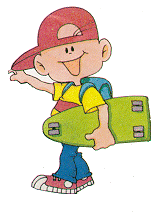 The educating process has values
that cannot only be restricted to acquiring technical knowledge at school desks. The educating process has values
that cannot only be restricted to acquiring technical knowledge at school desks.
Ever-increasingly, the
transmission and internalisation of norms and behaviour of an eminently civic sense are
demanded, and these are also the interactive object of the global learning process.
By means of the A Clean
Lisbon has a different Appearance programme, developed in all primary schools of the
Official Primary Education, over the last five years we have tried to provide teachers and
students with information related to the problems of solid urban wastes, reducing,
re-using and recycling materials and, in a general manner, about correct behaviour to be
adopted in conserving nature and the quality of urban life.
A training and testing
atelier, associated to a Cleaning Museum, that provides youngsters with updated
information in the areas mentioned, takes note of the development of equipment used in
cleaning and removal/disposal of wastes and makes practical testing in areas such as
recycling and re-using materials makes up the necessary complement necessary for the
environmental education programmes in the solid wastes area in progress at primary schools
of the Official Primary Education.
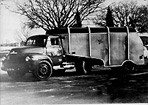 Thus, the Cleaning Museum
Atelier hopes to collaborate in the education process, by means of tools which aid
competency for the action. In this way, it will be possible to render concrete an
integrated training of citizens participating in the construction of a quality
environment. Thus, the Cleaning Museum
Atelier hopes to collaborate in the education process, by means of tools which aid
competency for the action. In this way, it will be possible to render concrete an
integrated training of citizens participating in the construction of a quality
environment.
To be installed in the space next to the
Boa-Hora cleaning post, the Cleaning Museum Atelier is contemplating a group of activity
areas (room for permanent and temporary exposition, Journey Inside Waste, ateliers - paper
and glass recycling, re-using materials, training, documentation centre) which will make
possible the diversification of the public, an enrichment in the sharing of experiences. |
| Local Community Intervention
Changing the
waste removal system in the historical areas of Lisbon
The old areas of
Lisbon have very specific urban characteristics, be it at the level of buildings or in
terms of the people living there. The hermetic containers for solid waste removal in
Lisbon (in 1979) did not obtain very positive results in terms of that expected in the
area of maintaining the streets clean. The layout of the roads - winding and very narrow
-, buildings with very small common areas to hold the containers, the elderly population
living there are some of the factors that led the Department of Urban Hygiene and Solid
Waste to create a removal system suited to the urban and social structure of these
communities.
Aware of the specific
characteristics of each community, this evaluation has been made according to each case,
requiring specific solutions.
This new system for
depositing and removing domestic wastes has been implemented at the Castle, Alfama, Bica
and in restricted areas of the parishes of São Vicente, São José and Coração de
Jesus.
There is a common
intervention method where one seeks to integrate technically suitable solutions to the
level of solid urban wastes removal, with the characteristics of urban structure and
residing community, the motivation of local organisations to participate and developing
actions which seek to surpass the awareness level to reach environmental education.
In this way, one hopes to
contribute to the generalisation of environmentally- friendly behaviour and to a greater
environmental awareness.
Each neighbourhood building its
environment
This is an Environmental
Awareness Project within the scope of solid urban wastes and is aimed at families living
in welfare neighbourhoods.
The actions developed
are based on local partnerships and are planned according to the characteristics of each
neighbourhood. Actions linked to the following are put into practice: registering and
licensing dogs, information/training actions aimed at shop owners/traders and re-use
ateliers.
Door-to-door
Janitors can potentially
transmit/circulate the municipality's activity of managing solid urban wastes to
condominiums. Transmitting good practices in matters related to urban hygiene and cleaning
and conserving resources close to this public strengthens information and awareness
projects set in motion by the municipality. |
|

